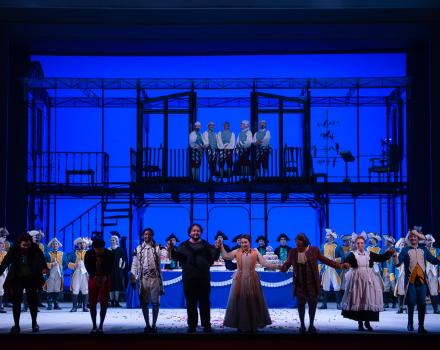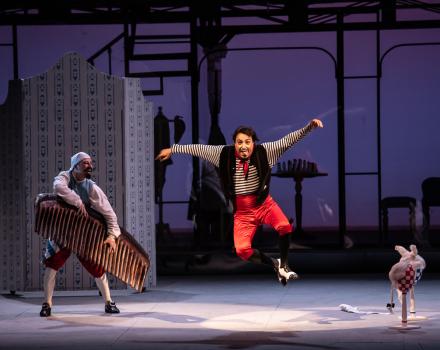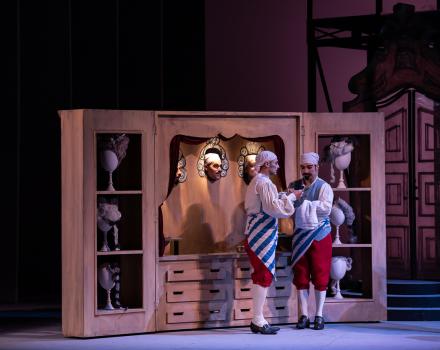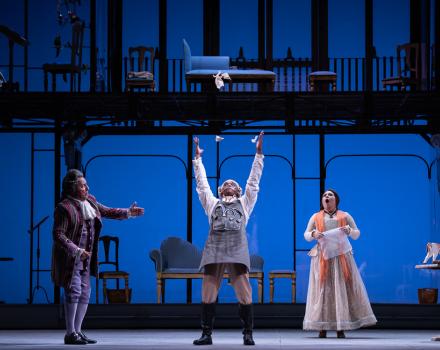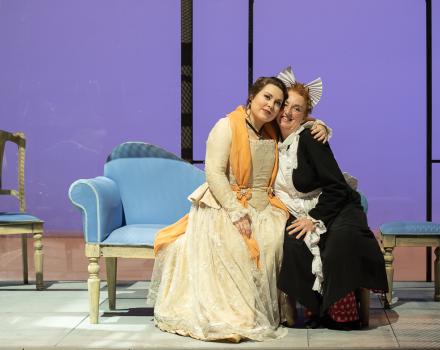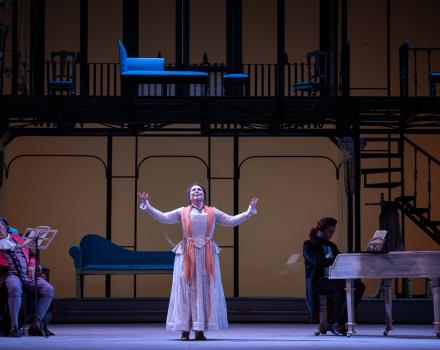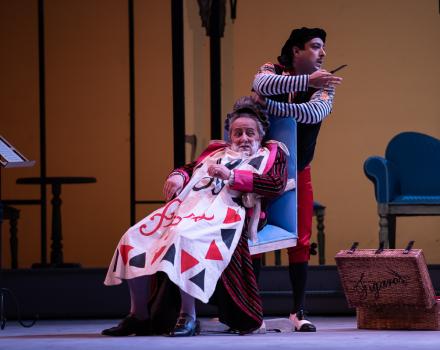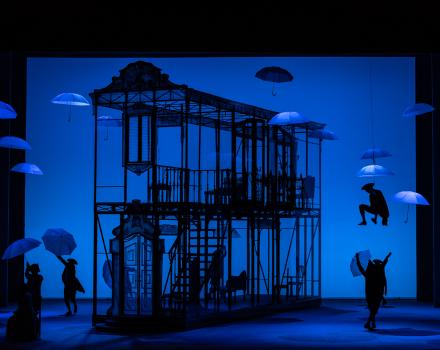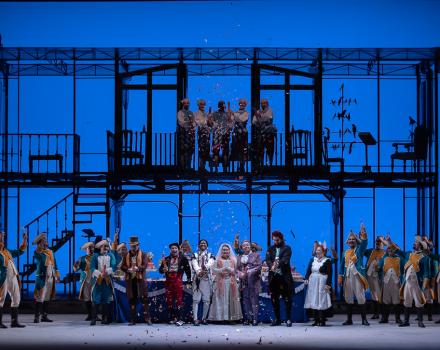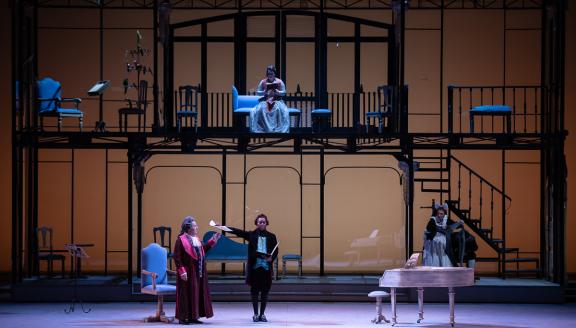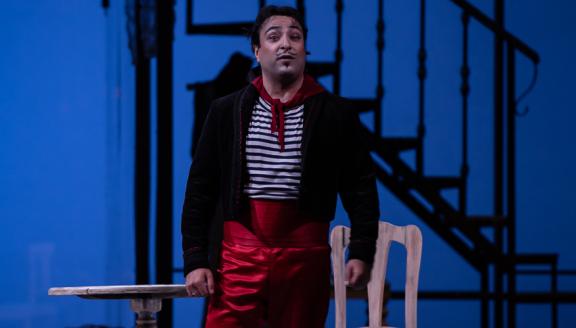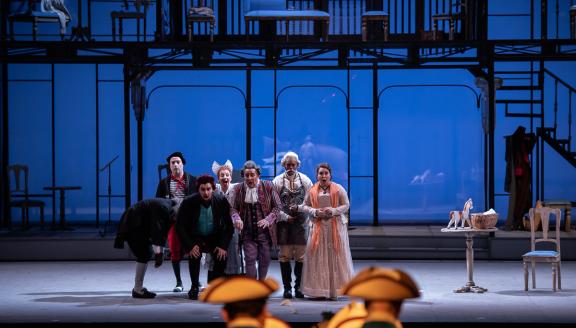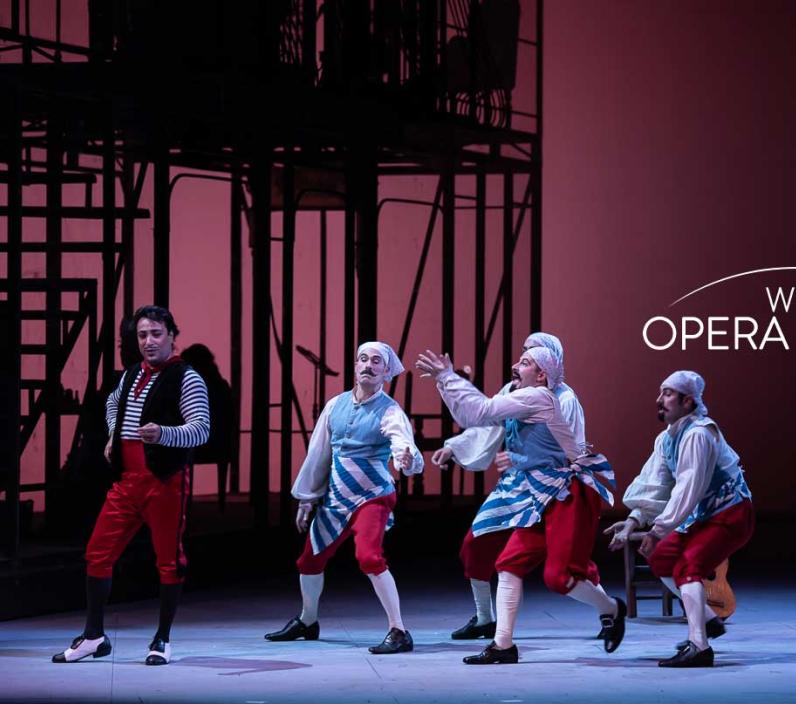

The Barber of Seville

A passionate count enlists a local barber and jack-of-all-trades to help him woo and wed a quick-witted woman. But it will take all their cunning - as well as some disguises and bribes - to ensure love wins the day.
Full of memorable melodies and larger-than-life characters, Rossini’s comic masterpiece is sheer entertainment. Starring Operalia winner Levy Sekgapane as Count Almaviva, this performance from the National Opera of Chile is part of OperaVision’s events celebrating the inaugural World Opera Day on 25 October 2019.
Cast
Fígaro | Rodion Pogossov |
|---|---|
Count Almaviva | Levy Sekgapane |
Rosina | Victoria Yarovaya |
Don Bartolo | José Fardilha |
Don Basilio | Pavel Chervinsky |
Berta | Jeannette Fischer |
Fiorello | Javier Weibel |
Chorus | Choir of the Municipal de Santiago |
Orchestra | Orchestra of the Municipal de Santiago |
| ... | |
Music | Gioachino Rossini |
|---|---|
Conductor | José Miguel Pérez-Sierra |
Director | Fabio Sparvoli |
Sets | Giorgio Richelli |
Lighting | José Luis Fiorruccio |
Costumes | Simona Morresi |
Text | Cesare Sterbini |
Chorus Master | Jorge Klastornick |
| ... | |
Video
The story
Act I
In Seville, Count Almaviva wants to marry Rosina. He has disguised himself as a poor student in the hope that she will fall in love with him unconditionally rather than for his title or money. Rosina lives with the much older Doctor Bartolo, her guardian, who wants to marry her himself as soon as possible and receive her dowry. The Count serenades Rosina outside her window, but she fails to appear on her balcony. Figaro, the local barber, recognises him and offers to help. He tells the Count to pretend to be a drunken soldier and demand to stay at Bartolo’s house. That way he will be able to get close to Rosina.
Inside the house, Rosina writes a letter to the student she heard outside her window. Don Basilio, her music teacher, tells Bartolo that he should be suspicious of Rosina and the Count. When the latter arrives in his disguise, he passes a love letter to Rosina and whispers that he is in fact the student who serenaded her. Bartolo suspiciously demands to know what is in the piece of paper, but Rosina fools him by handing over her laundry list instead. Bartolo and the Count argue loudly, the noise attracting the attention of the Police Sergeant and his officers, who crowd into the room. Bartolo demands that they arrest the drunken soldier, but Almaviva quietly reveals his true identity to the Sergeant, who then stands down, causing complete chaos and utter confusion.
Act II
Count Almaviva appears at Bartolo's door, this time disguised as a priest. He tells the doctor that he is also a singing tutor and has come to replace the suddenly ill Don Basilio in teaching Rosina. Bartolo is suspicious but allows the lesson to take place under his supervision. Figaro arrives to shave Bartolo’s beard, distracting him enough for the Count and Rosina to declare their mutual love and plan their escape. When Basilio turns up, the Count tries to bribe him into leaving and comments on how sickly he looks. But Bartolo smells a rat and asks Basilio to summon the notary so that he can marry Rosina immediately.
During a storm, the Count and Figaro climb a ladder to Rosina’s bedroom to take her away. But as they are about to escape, they find that the ladder has disappeared. Hearing footsteps approaching, Figaro gives Basilio an offer he can’t refuse, forcing him to witness the marriage between Rosina and Almaviva. Bartolo barges in but it is too late, the marriage contract has been signed. Receiving Rosina’s dowry in compensation, he reluctantly accepts the situation and joins in as everyone sings an anthem to love.
Insights
Intelligence wins the day
José Miguel Pérez-Sierra conducts The Barber of Seville at Teatro Municipal de Santiago. Here, the Spanish maestro explains his love for Rossini and why the opera has stood the test of time.
The Barber of Seville deals with subjects that were universal in Rossini’s time and still are today, such as the question of the new bourgeoisie and the social mobility represented by Figaro. He is a man of humble origins who, using only his intelligence, hard work and know-how, manages to become his own boss. He sets up his barbershop and becomes, in his own words, a factotum, the one who does everything in the city. Everyone counts on him to help them out no matter the situation.
While opera was elitist in its day, here was a character with whom the more modest and hard-working classes also identified. It was a great manifesto in favour of social progress, but on the other hand it did not offend the nobility or the wealthy, so it could be enjoyed by people of backgrounds and tastes. That is why it became the most popular of all Rossini’s operas and why it has always remained in the repertoire.
I conducted La Cenerentola at the Teatro Municipal de Santiago in 2017. On a musical level, these two Rossini operas are very similar, as they were written within a year or two of each other. Perhaps the content of La Cenerentola is more moral. After all, it is a fable, which means there must be a moral to extract from it that can be applied to real life. In La Cenerentola, it is goodness that triumphs, while in The Barber of Seville, it is intelligence. Let us say that in the latter opera, the content is more social than moral. It shows that anyone with intelligence can win the day.
It has been a joy to work with the cast and creative team at Ópera Nacional de Chile. Fabio Sparvoli is a stage director with brilliant ideas. Patricio Sabaté, Evelyn Ramírez and Sergio Gallardo are really extraordinary Rossini singers and would be welcome in any theatre in the world. The principal roles are performed by world-class artists: Russian baritone Rodion Pogossov, who has played Figaro at the Metropolitan Opera in New York; Russian mezzo-soprano Victoria Yarovaya, who for me is the number one Rosina in the world; South African tenor Levy Sekgapane as Count Almaviva, who won First Prize at the 2017 Operalia; and Swiss soprano Jeannette Fischer, who is the great Berta of the last 30 years and the last one to record The Barber of Seville with Alberto Zedda. I am grateful that we have been able to rent the late conductor’s edition of the score from Ricordi, as the orchestration is faithful to Rossini’s original manuscript.
I have been conducting Rossini since the start of my career and I am still captivated by the composer’s originality. It is fascinating to see how The Barber of Seville or La Cenerentola have remained in the repertoire and have always been loved by the public. I also find it incredible that of his thirty-nine operas, almost all of them have been revived in the last half century and are now frequently scheduled. They had been left unstaged for a hundred years before that but each new performance has been a success.
For some reason, Rossini is an absolutely contemporary, topical composer who excites the audience in a remarkable way. His music is incredible and is filled with an extraordinary theatricality. There have been very few like him since. He really was a genius.
This text is based on an interview with José Miguel Pérez-Sierra that first appeared in the programme book for The Barber of Seville in September 2018.
Gallery
